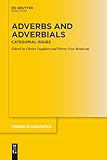Adverbs and Adverbials : Categorial Issues / ed. by Olivier Duplâtre, Pierre-Yves Modicom.
Material type: TextSeries: Trends in Linguistics. Studies and Monographs [TiLSM] ; 371Publisher: Berlin ; Boston : De Gruyter Mouton, [2022]Copyright date: ©2022Description: 1 online resource (VII, 280 p.)Content type:
TextSeries: Trends in Linguistics. Studies and Monographs [TiLSM] ; 371Publisher: Berlin ; Boston : De Gruyter Mouton, [2022]Copyright date: ©2022Description: 1 online resource (VII, 280 p.)Content type: - 9783110767940
- 9783110768015
- 9783110767971
- online - DeGruyter
- Issued also in print.
| Item type | Current library | Call number | URL | Status | Notes | Barcode | |
|---|---|---|---|---|---|---|---|
 eBook
eBook
|
Biblioteca "Angelicum" Pont. Univ. S.Tommaso d'Aquino Nuvola online | online - DeGruyter (Browse shelf(Opens below)) | Online access | Not for loan (Accesso limitato) | Accesso per gli utenti autorizzati / Access for authorized users | (dgr)9783110767971 |
Frontmatter -- Contents -- List of abbreviations -- Introduction – Adverbs and adverbials: Categorial issues -- I Delimitational approaches -- 1 Consistency of the class -- The incoherence of the English adverb class -- The subcategorization of English adverbs: A feature-based clustering approach -- 2 Margins of the class -- Proteus: Adverbial multi-word expressions in Italian and their cognate counterparts in –mente -- Prenominal adverbs in German? The cases of auf and zu -- II Classificational approaches -- 3 Adverbial scope: beyond the low / high dichotomy -- ‘Sentence adverbs’ don’t exist! -- Formal and functional features of modal adverbs in French and Modern Greek -- Different types of subject-oriented adverbials in French and in Mandarin Chinese: A contrastive study -- 4 The case of domain adverb(ial)s -- Domain adverbials and morphology: The rivalry between -mäßig and -technisch in German -- Framing, segmenting, indexing: Towards a functional account of Romance domain adverbs in written texts -- List of contributors -- Index
restricted access online access with authorization star
http://purl.org/coar/access_right/c_16ec
Adverbs seem to raise unsolvable issues for theories of word-classes, both crosslinguistically and language-internally. The contributions in this volume all address this categorial problem from a variety of formal and functional points of view. In the first part, current definitions of the class for Romance and Germanic languages are being questioned and improved, drawing on data from English, German and Italian. The second part is devoted to adverbial scope in Romance (French, Italian and Brazilian Portuguese), Germanic, Modern Greek and Chinese, under special consideration of modal adverbs, subject-oriented manner adverbs and domain adverbs and adverbials. Syntactic and semantic relationships appear to lay the ground for a robust and fine-grained functional definition of adverbs and adverbials.
Issued also in print.
Mode of access: Internet via World Wide Web.
In English.
Description based on online resource; title from PDF title page (publisher's Web site, viewed 25. Jun 2024)


